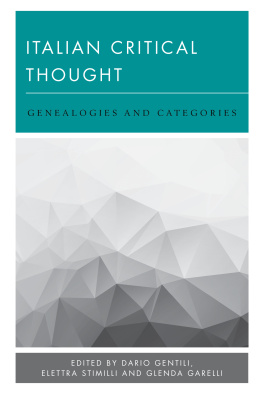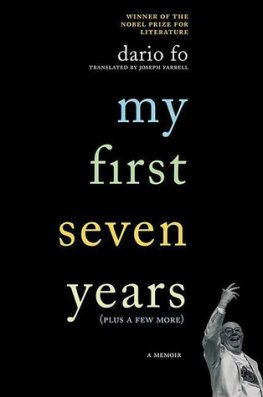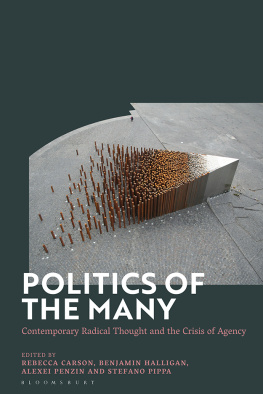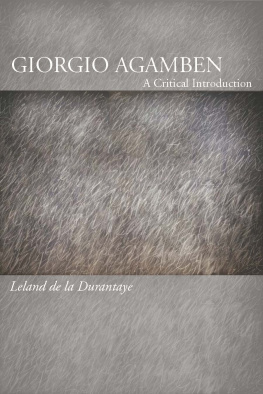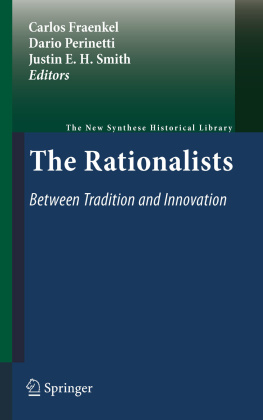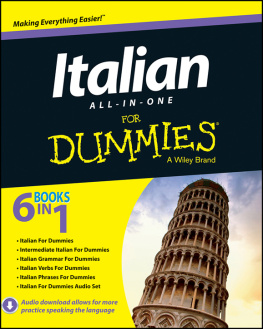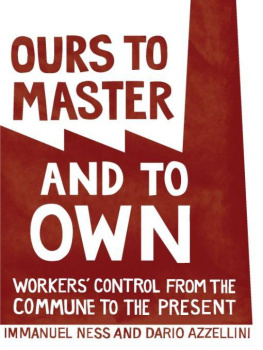Gentili Dario - Italian Critical Thought
Here you can read online Gentili Dario - Italian Critical Thought full text of the book (entire story) in english for free. Download pdf and epub, get meaning, cover and reviews about this ebook. year: 2012, publisher: Rowman & Littlefield International, genre: Politics. Description of the work, (preface) as well as reviews are available. Best literature library LitArk.com created for fans of good reading and offers a wide selection of genres:
Romance novel
Science fiction
Adventure
Detective
Science
History
Home and family
Prose
Art
Politics
Computer
Non-fiction
Religion
Business
Children
Humor
Choose a favorite category and find really read worthwhile books. Enjoy immersion in the world of imagination, feel the emotions of the characters or learn something new for yourself, make an fascinating discovery.
- Book:Italian Critical Thought
- Author:
- Publisher:Rowman & Littlefield International
- Genre:
- Year:2012
- Rating:4 / 5
- Favourites:Add to favourites
- Your mark:
- 80
- 1
- 2
- 3
- 4
- 5
Italian Critical Thought: summary, description and annotation
We offer to read an annotation, description, summary or preface (depends on what the author of the book "Italian Critical Thought" wrote himself). If you haven't found the necessary information about the book — write in the comments, we will try to find it.
Italian Critical Thought — read online for free the complete book (whole text) full work
Below is the text of the book, divided by pages. System saving the place of the last page read, allows you to conveniently read the book "Italian Critical Thought" online for free, without having to search again every time where you left off. Put a bookmark, and you can go to the page where you finished reading at any time.
Font size:
Interval:
Bookmark:
Italian Critical Thought
New Politics of Autonomy
Series Editors: Saul Newman and Martina Tazzioli
In recent years, we have witnessed an unprecedented emergence of new forms of radical politics from Tahrir Square, Gezi Park and the global Occupy movement, to Wikileaks and hacktivism. What is striking about such movements is their rejection of leadership structures and the absence of political demands and agendas. Instead, their originality lies in the autonomous forms of political life they engender.
The New Politics of Autonomy book series is an attempt to make sense of this new terrain of anti-political politics, and to develop an alternative conceptual and theoretical arsenal for thinking the politics of autonomy. The series investigates political, economic and ethical questions raised by this new paradigm of autonomy. It brings together authors and researchers who are engaged, in various ways, with understanding contemporary radical political movements and who approach the theme of autonomy from different perspectives: political theory, philosophy, ethics, literature and art, psychoanalytic theory, political economy, and political history.
Titles in the Series
Spaces of Governmentality, by Martina Tazzioli
The Composition of Movements to Come, by Stevphen Shukaitis
Foucault and the Making of Subjects, edited by Laura Cremonesi, Orazio Irrera, Daniele Lorenzini and Martina Tazzioli
Italian Critical Thought: Genealogies and Categories, edited by Dario Gentili, Elettra Stimilli and Glenda Garelli
In the Marxian Workshops: Producing Subjects, by Sandro Mezzadra
Anarchisms, Postanarchisms and Ethics, Benjamin Franks
Italian Critical Thought
Genealogies and Categories
Edited by Dario Gentili, Elettra Stimilli and Glenda Garelli
Translated by Glenda Garelli

London New York
Published by Rowman & Littlefield International, Ltd.
Unit A, Whitacre Mews, 26-34 Stannary Street, London SE11 4AB
www.rowmaninternational.com
Rowman & Littlefield International, Ltd., is an affiliate of
Rowman & Littlefield
4501 Forbes Boulevard, Suite 200, Lanham, Maryland 20706, USA
With additional offices in Boulder, New York, Toronto (Canada), and London (UK)
www.rowman.com
Copyright 2018 by Dario Gentili, Elettra Stimilli and Glenda Garelli
All rights reserved. No part of this book may be reproduced in any form or by any electronic or mechanical means, including information storage and retrieval systems, without written permission from the publisher, except by a reviewer who may quote passages in a review.
British Library Cataloguing in Publication Information
A catalogue record for this book is available from the British Library
ISBN: HB 978-1-78660-450-7
ISBN: PB 978-1-78660-451-4
Library of Congress Cataloging-in-Publication Data Is Available
ISBN 978-1-78660-450-7 (cloth: alk. paper)
ISBN 978-1-78660-451-4 (pbk: alk. paper)
ISBN 978-1-78660-452-1 (electronic)
 TM The paper used in this publication meets the minimum requirements of American National Standard for Information Sciences Permanence of Paper for Printed Library Materials, ANSI/NISO Z39.48-1992.
TM The paper used in this publication meets the minimum requirements of American National Standard for Information Sciences Permanence of Paper for Printed Library Materials, ANSI/NISO Z39.48-1992.
Printed in the United States of America
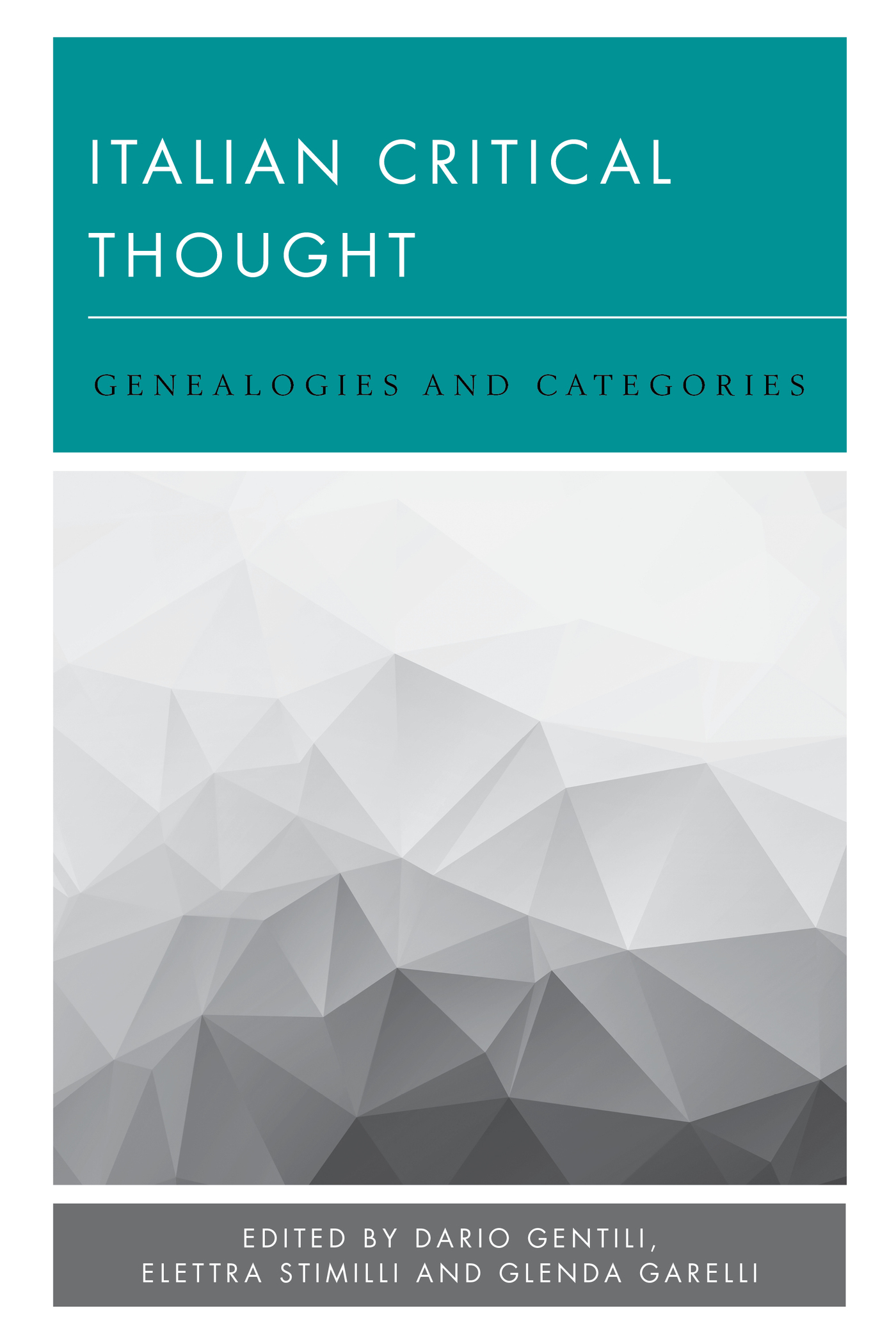
We are indebted to Michele Filippini, Theodore Lance and Dhara Snowden for their editorial wisdom. We would also like to thank the publisher DeriveApprodi and Ilaria Bussoni for allowing the publication of some of the essays of Differenze Italiane in their English translation as part of this volume.
Dario Gentili and Elettra Stimilli
Alternative Narrative and Political Operation
The essays collected in this volume represent an overview of the debate that was spurred internationally by the so-called Italian Theoryunderstood as the horizon within which the authors and categories that characterize Italian philosophy and politics can be thought. Italian Theory is certainly a provisional expression, whichwith a certain ironywas coined on the mould of French Theory, an expression that usually labels the influence and the reception of French Thought in the United Statesor anyway outside this thoughts national boundariesafter World War Two. Temporariness characterizes the way in which the expression Italian Theory was acquired from the outset. The later proposed formulation, i.e., Italian Thought (Esposito, 2018), better accounts for such temporariness. It suggests the intention of not configuring a theory that would neutralize the discordances and antagonisms that characterize the different positions composing the field of contemporary Italian critical thought. As some of the essays in this volume demonstrate, Italian critical thought is in fact a field of tension whose territory is mapped and delineated exactly by differences and conflicts. Also the territory is hence irreducible to boundariesbe these boundaries those of an alleged Italianness or those of theory. It is in fact constantly marked by trespassings or, as Deleuze would put it, crisscrossed by deterritorialization vectors.
Exactly because of this tension towards the outside of any national determinationa tension that defines a constitutive element of Italian philosophy (Esposito, 2012)the essays here collected amount to a markedly different operation with respect to their publication in Italian in a volume this text draws from (Gentili and Stimilli, 2015). In the case of the collection we are presenting here, one should at least consider which operation one is about to undertake. We can talk about operation using the term that Alain Badiou utilizes to speak about the moment of contemporary French philosophy which took shape starting from the 1970s (Badiou, 2012). If, in fact, French Theory is an American adventure in French theory, as Franois Cusset wrote in his successful 2008 book (Cusset, 2008: 9), then the question that could be asked to introduce this volume is: Is Italian Theory an analogous phenomenon to that of French Theory? Are we in the presence of an analogous operation?
The assimilation of rather different authors, such as Michel Foucault, Gilles Deleuze, and Jacques Derridawhich is at the origin of the American creation of French Theorywas produced right after the years of student contestation when American universities found themselves having to face a decade characterized by a return to order, economic recessions, and the advent of neoliberal policies increasingly determined to set up learning and knowledge spaces after the model of the market. French Theory is hence invented in North American universities exactly at the time when an unprecedented alliance between knowledge transmission and the economic order was developing. It was a reaction, more than an action, which coincided with the isolation of humanities departments (where the phenomenon mainly developed), and with the affirmation of analytical philosophy in philosophy departments.
But the diffusion of French Theory was also produced at the threshold where university campuses and spaces of dissidence were both separated and connected. This was a zone where artistic experimentations resonated with avant-garde critical analyses. In the weakening process that characterized continental philosophy in the face of analytic philosophys advancement, what also emerged is a new political and social role that continental theory could play and that was not limited to the classical statute of philosophical knowledge but instead took its shape exactly from the critique of metaphysicsa critique that the main representatives of French Theory carried out with an unprecedented radical approach which also carried philosophy outside of itself, so to speak, leading it towards the arts, literature, and politics.
Font size:
Interval:
Bookmark:
Similar books «Italian Critical Thought»
Look at similar books to Italian Critical Thought. We have selected literature similar in name and meaning in the hope of providing readers with more options to find new, interesting, not yet read works.
Discussion, reviews of the book Italian Critical Thought and just readers' own opinions. Leave your comments, write what you think about the work, its meaning or the main characters. Specify what exactly you liked and what you didn't like, and why you think so.

